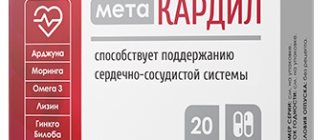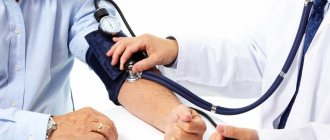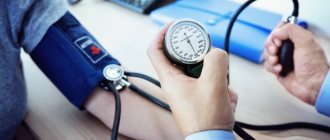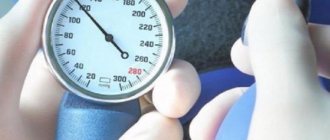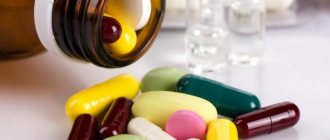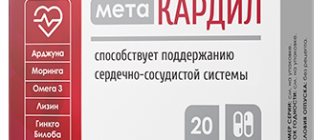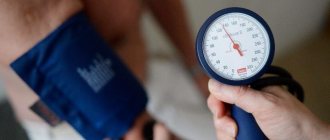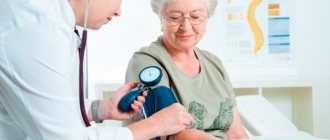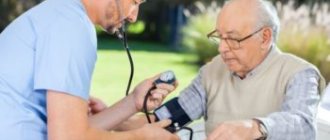Hypertension is a pathology accompanied by a persistent increase in blood pressure above 130/90. It entails changes in the functioning of internal organs, as well as disruption of a person’s well-being. This disease is progressive.
Causes of hypertension
The main reason is a decrease in the lumen of small vessels, impeding blood flow. The pressure on the walls of blood vessels increases, and blood pressure increases, because the heart muscle needs more effort to push blood through the bloodstream.
The following risk factors for developing the disease are identified:
- the age of the person (women over 65 years old, men over 55 years old);
- cholesterol level (above 6.5 mmol/liter);
- heredity (presence of cardiovascular diseases in relatives);
- smoking;
- obesity;
- diabetes;
- sedentary lifestyle of an elderly person.
Symptoms of hypertension
Common symptoms of hypertension are:
- tinnitus;
- headache;
- facial redness;
- dizziness;
- cardiopalmus;
- memory impairment;
- profuse sweating;
- attacks of pulsation in the head;
- chills;
- puffiness around the eyes;
- attacks of irritability, anxiety;
- “flies” flashing before the eyes;
- constant fatigue, decreased performance, a feeling of systematic lack of sleep;
- numbness and swelling of the toes and hands.
The increase in blood pressure occurs intermittently and goes away after calming or resting. If you do not begin to correct the disease, the symptoms progress and become permanent, after which they are joined by the following:
- impaired coordination of movements;
- blurred vision;
- decreased intelligence and memory;
- changes in gait;
- weakness in arms or legs;
- decreased overall sensitivity;
- problems with the functioning of blood vessels, kidneys, and brain.
Hypertension, in addition to the main symptoms (high blood pressure, etc.), has a number of clinical signs that are individual at different stages of the disease in an elderly person.
Symptoms of stage 1 hypertension include:
- low rises in blood pressure (up to 160-180 at 95-105 mmHg);
- episodes of tinnitus, headaches, difficulty concentrating and sleeping;
- fluctuations in blood pressure (it does not return to normal on its own);
- nosebleeds.
If hypertension is suspected, the doctor does not detect at this stage any abnormalities in kidney function or changes during ECG and ultrasound of the heart.
Symptoms of stage 2 hypertension:
- a steady increase in blood pressure (up to 180-200 per 105-115 mm Hg);
- headache;
- fundus changes;
- pain in the heart area;
- periodic occurrence of hypertensive crises;
- signs of brain damage with strokes and ischemia;
- kidney damage;
- signs of damage to the heart muscle in the form of ischemia and hypertrophy;
In the third stage of the disease, the following symptoms are observed:
- high blood pressure (220-230 per 130-150 mmHg);
- circulatory failure;
- signs of encephalopathy;
- microinfarctions, angina pectoris, microstrokes, arrhythmias;
- eye lesions with severe angiopathy and blindness;
- decreased filtration rate and blood flow of the kidneys.
A decrease in blood pressure to a normal level does not occur on its own (only under the influence of strong drugs).
Increased blood pressure and rapid pulse
Typically, with increased blood pressure, the heart rate always increases. This is how our heart tries to adapt to the increased blood pressure on the vascular walls. If the normal pulse is from 60 to 80 beats per minute, then with a pressure of 220 to 140 the number of beats can reach 100 or more.
However, there are completely opposite cases when, with increased pressure, the pulse goes beyond the lower limits of normal. This shows that the heart muscle is not coping with its task.
This is scary because when using antihypertensive drugs, for example, calcium channel blockers, not only the blood pressure decreases, but also the pulse, and if it is already low, then you can cause a heart attack, which will require urgent intervention from specialists and every second will be important. Therefore, it is important to pay attention to the pulse when measuring blood pressure.
Diagnostics
The diagnosis of hypertension is based on monitoring blood pressure at home (during exercise and at rest). You can monitor your blood pressure using automatic or manual pressure gauges.
When diagnosing hypertension in the clinic, the following is carried out:
- detailed questioning of the patient, accurate recording of all risk factors, the doctor identifies predispositions to the disease;
- clinical examination (the doctor measures the person’s pulse and blood pressure);
- daily monitoring of blood pressure (prescribed if necessary);
- conducting Holter monitoring, performing an electrocardiogram;
- determining the stability of blood pressure levels, minimum and maximum numbers, the effects of medications, etc.;
- consultations with a nephrologist, neurologist, endocrinologist;
- laboratory diagnostics (general analysis and biochemistry of blood and urine, levels of sodium and calcium, phosphates and uric acid, plasma potassium, etc.);
- chest x-ray;
- Ultrasound of the kidneys, heart;
- diagnostics using bicycle ergometry, load tests (if necessary).
How to treat blood pressure 220 to 140
A doctor can prescribe treatment for high blood pressure with medications only after a comprehensive examination of the patient. In this case, the specialist must carefully select the exact dosage and type of drug, taking into account the patient’s age, weight, medical history and the presence of chronic pathologies.
What medications can be used to treat high blood pressure:
- Diuretics (diuretics) - remove unnecessary fluid from the body, relieve swelling. (“Furosemide”, “Indapamide”).
- Calcium channel blockers - reduce the contraction of vascular walls, due to which the vessels dilate and blood flow is restored. (“Nifedipine”, “Verapamil”).
- Angiotensin-converting enzyme inhibitors (“Enalapril”, “Enap”).
- Beta and alpha adrenergic blockers. They reduce the pulse, improve vascular conductivity, relieve tension in the heart muscle and block the effect of adrenaline on the vascular walls. (“Bisoprolol”, “Timolol”, “Metoprolol”).
As an aid, the doctor may recommend a tincture of medicinal herbs. It could be motherwort, peony or valerian. They have a calming effect.
Never self-medicate. Some people simply find out the name of antihypertensive drugs from pharmacists and take them when their blood pressure rises. This is not only wrong, but also extremely dangerous. Simply lowering blood pressure is not a treatment, it is an elimination of symptoms, and in this disease it is important to find the cause of its increase and eliminate it. By self-medicating, patients only aggravate the situation, increasing the risk of severe consequences, including death.
Treatment of the disease
Treatment of hypertension is complex and depends on the stage, severity, causes, gender and age of the person and other factors. The disease cannot be completely cured, but the patient’s condition can be significantly improved and the onset of life-threatening complications can be delayed for a long time. Treatment can be non-drug and medicinal.
Non-drug therapy. It involves adjusting the patient’s lifestyle. Most patients do not attach much importance to it, considering it frivolous, but such treatment is the key to success.
First of all, it is necessary to review the diet of the sick person, reduce the intake of carbohydrates and fats, and increase the intake of proteins and vitamins. You should reduce your caloric intake, which will subsequently lead to a reduction in cholesterol and body weight. It is also necessary to normalize the drinking regime, reduce salt consumption to 5 g per day.
When treating hypertension in older people, spa therapy and climatotherapy are especially recommended. The doctor prescribes therapeutic exercises and physical education. Reducing anxiety levels and using psychotherapy methods are helpful.
Pharmacological treatment. Quite often, in the treatment of hypertension, the principle of “steps” is used when prescribing medications. Groups of drugs are prescribed in the required sequence, since drugs have different degrees of impact in the mechanism of increasing blood pressure. When a person achieves a stable decrease in blood pressure, the doctor transfers the patient to maintenance therapy.
- When treating grade 1 high blood pressure, one antihypertensive drug is usually prescribed, which is taken on an outpatient basis under the supervision of a specialist. Medicines are prescribed in courses lasting several weeks.
- When treating stage 2 hypertension or when monotherapy is ineffective, the doctor usually prescribes 2 drugs. Therapy is carried out in a hospital. If an elderly person experiences a stable decrease in blood pressure, the patient continues treatment at home.
- Treatment of stage 3 hypertension requires an individual approach. It is carried out in a hospital until the condition stabilizes. The doctor evaluates the results of the examinations and prescribes a special course of treatment for stage 3 hypertension.
First aid
First of all, you need to quickly call an ambulance, and while you are waiting, you can take a number of measures:
- The patient should take a comfortable position - sitting (put a pillow under the lower back) or lying down (head raised).
- Provide fresh air access to the room.
- If the patient is chilling, cover him. You can take a warm foot bath for 10 minutes.
- If there is pain in the heart, then give nitroglycerin under the tongue.
- If the patient knows about his disease and takes a certain medicine prescribed by a specialist, then he must take it.
Prevention
Methods for preventing the disease are primary and secondary.
Primary prevention is necessary for healthy people who are predisposed to pathology. You need to go in for sports, fitness, do morning exercises, swim. It is important to consider that the loads should be moderate or light. A person also needs to give up bad habits, limit the consumption of salt, carbohydrates and animal fats. The diet should be enriched with calcium and potassium (dairy products, nuts, dried fruits, etc.).
Secondary prevention is carried out in patients who have been diagnosed with hypertension. It includes monitoring blood pressure, regular visits to the doctor and non-drug therapy. It is recommended to conduct acupuncture sessions, massage, and take herbal remedies and antioxidants.
The ABC-Medicine clinic provides a full range of services for the diagnosis, prevention and treatment of hypertension. Call us at + and our consultants will answer all your questions in detail and make an appointment with a cardiologist.
What should a hypertensive patient do?
A person who has hypertension or has had blood pressure rise to 220/140 at least once must adhere to the following rules:
- Eat healthy. Avoid salty and sweet foods and fast foods. Eat more vegetables, fruits, greens.
- Eliminate bad habits from your life.
- If you are overweight, get rid of it. Start playing sports, dancing, running, swimming, race walking - whatever you like. Do physical exercises in the fresh air, so your organs and tissues will be more quickly saturated with oxygen and nutrients. That is, the main rule is to constantly move.
- Follow a work and rest schedule. Even if you work continuously and for a long time at the computer, always take a few minutes to relax, stand up, move around and restore normal blood circulation.
- Monitor your blood pressure and take medications prescribed by your doctor, and visit specialists in a timely manner.
Know that only you can fully take care of your health!

